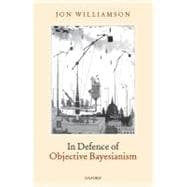
Note: Supplemental materials are not guaranteed with Rental or Used book purchases.
Purchase Benefits
What is included with this book?
| Introduction | p. 1 |
| Objective Bayesianism outlined | p. l |
| Objective Bayesian theory | p. 2 |
| Criticisms of objective Bayesianism | p. 3 |
| Evidence, Language, and rationality | p. 4 |
| Objective Bayesianism | p. 10 |
| Desiderata for a theory of probability | p. 10 |
| From Jakob Bernoulli to Edwin Jaynes | p. 12 |
| A characterization of objective Bayesianism | p. 26 |
| Motivation | p. 31 |
| Beliefs and bets | p. 31 |
| Probability | p. 33 |
| Calibration | p. 39 |
| Equivocation | p. 49 |
| Radical subjectivism | p. 72 |
| Updating | p. 75 |
| Objective and subjective Bayesian updating | p. 75 |
| Four kinds of incompatibility | p. 78 |
| Criticisms of conditionalization | p. 82 |
| A Dutch book for conditionalization? | p. 85 |
| Conditionalization from conservativity? | p. 88 |
| Summary | p. 89 |
| Predicate Languages | p. 90 |
| The framework | p. 90 |
| The Probability norm | p. 92 |
| Properties of the closer relation | p. 95 |
| Closure | p. 96 |
| Characterizing Equivocation | p. 98 |
| Order invariance | p. 101 |
| Equidistance | p. 103 |
| Objective Bayesian Nets | p. 108 |
| Probabilistic networks | p. 108 |
| Representing objective Bayesian probability | p. 112 |
| Application to cancer prognosis | p. 116 |
| Probabilistic Logic | p. 121 |
| A formal framework for probabilistic logics | p. 121 |
| A range of semantics | p. 123 |
| Objective Bayesian semantics | p. 129 |
| A calculus for the objective Bayesian semantics | p. 133 |
| Judgement Aggregation | p. 136 |
| Aggregating judgements | p. 136 |
| Belief revision and merging | p. 137 |
| Merging evidence | p. 139 |
| From merged evidence to judgements | p. 142 |
| Discussion | p. 144 |
| Languages and Relativity | p. 148 |
| Richer languages | p. 148 |
| Language relativity | p. 155 |
| Objectivity | p. 157 |
| Objective Bayesianism in Perspective | p. 163 |
| The state of play | p. 163 |
| Statistics | p. 165 |
| Confirmation and science | p. 169 |
| Epistemic metaphysics | p. 170 |
| References | p. 173 |
| Index | p. 183 |
| Table of Contents provided by Ingram. All Rights Reserved. |
The New copy of this book will include any supplemental materials advertised. Please check the title of the book to determine if it should include any access cards, study guides, lab manuals, CDs, etc.
The Used, Rental and eBook copies of this book are not guaranteed to include any supplemental materials. Typically, only the book itself is included. This is true even if the title states it includes any access cards, study guides, lab manuals, CDs, etc.